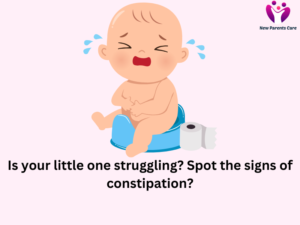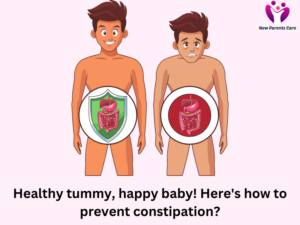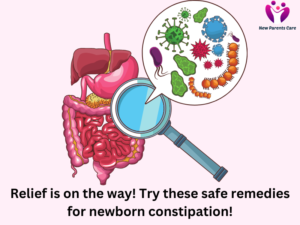INTRODUCTION
Newborns bring immense joy, but they also come with their share of challenges, especially for new parents. Among the various concerns that parents may encounter in the early days of their baby’s life, constipation is one of the most common. Understanding the causes, recognizing the symptoms, and knowing the right remedies and treatments can help parents address newborn constipation effectively and ensure their baby’s comfort and health. This blog will guide you through everything you need to know about newborn constipation.
WHAT IS CONSTIPATION IN NEWBORN BABIES?
Constipation is defined as when there is irregular bowel movements which might cause the bowel movements to become hard and difficult to pass. Constipation happens when the baby’s poop or stool becomes hard and dry. It majorly occurs when the baby is transitioning from consuming breast milk to solid foods. Having constipation may make it difficult for your newborn to poop. Consulting a doctor may be the best decision.
A quick FAQ about constipation in newborns: According to Pregnancy Birth and Baby Healthy babies under 6 months can sometimes strain and cry before passing soft poos. This is known as ‘dysphasia’ and unless their poos are also hard, this is not constipation and will resolve on it’s own.
According to statistics, constipation starts in the first year of life in 17% to 40% of babies.
SYMPTOMS IN BABIES DURING CONSTIPATION

Your baby may show signs of straining when trying to pass a poo. Your baby may be unsettled, may seem fussy or irritated. Your baby may be eating less or feeding less well than usual. A tear or crack might appear in the skin around the anus, which may at times bleed.
- Straining during bowel movements: Your baby may visibly struggle to pass stools, with reddening of the face, grunting, or clenching fists. This can indicate discomfort while trying to relieve themselves.
- Unsettled or irritable behavior: If your baby is fussy, crying more than usual, or seems irritable for no clear reason, it could be linked to the discomfort caused by constipation.
- Eating less or feeding poorly: Constipation may make your baby feel full or bloated, leading to a decrease in appetite or reluctance to feed as regularly as before.
- Hard, dry, or pellet-like stools: Instead of soft and easy-to-pass stools, your baby’s bowel movements may be hard, dry, and shaped like small pellets. This is a common sign of constipation.
- Fewer bowel movements: While the frequency of bowel movements can vary between babies, going more than 2-3 days without a bowel movement can be a sign of constipation, especially if accompanied by other symptoms.
- Tummy bloating or discomfort: You might notice that your baby’s belly looks bloated or feels firmer than usual. This can be caused by trapped gas or stool that hasn’t passed.
- Crying during bowel movements: If your baby cries or appears to be in pain when trying to pass stools, this could be due to the strain of constipation, as their stools are harder to push out.
- Tear or crack around the anus (anal fissure): A small tear or crack can develop around the anus due to the pressure of passing hard stools. This might sometimes cause a small amount of bleeding, visible either on the stool or diaper.
- Decreased wet diapers: A reduction in the number of wet diapers might suggest dehydration, which is a common cause of constipation. It’s essential to ensure your baby stays hydrated, especially if formula-fed.
WHAT LEADS TO NEWBORN CONSTIPATION AND HOW TO PREVENT IT?

Constipation in infants is mainly caused when the baby’s diet undergoes a change from the breast milk to solid foods and on the other hand may also be caused by a lack of nerves going to the intestines or by a problem with the way the intestine formed at birth.
- Transition from Breast Milk to Formula or Solid Foods
One of the most common causes of constipation in newborns is a change in diet. Babies who are exclusively breastfed are less likely to experience constipation, as breast milk is easily digestible and contains the right balance of nutrients to keep their digestive system functioning smoothly. However, when a baby transitions from breast milk to formula, or later to solid foods, their digestive system needs time to adjust. Formula milk can be more difficult for some babies to digest, and some solid foods (like rice cereal, bananas, or dairy products) can slow down digestion and lead to constipation.
- Dehydration
Another factor is dehydration. Babies get most of their fluids from breast milk or formula, but if they’re not drinking enough, their bodies absorb more water from the food they eat and the waste in their intestines, making stools harder and more difficult to pass. This is especially common when introducing solid foods, as babies may not take in enough water to compensate for the change in diet.
- Changes in Routine or Environment
Changes in a baby’s routine, such as traveling, or disruptions in feeding schedules, can also lead to constipation. Sometimes, even a change in the temperature or weather can affect how your baby’s body functions, leading to slower bowel movements.
- Low Fiber Diet
Once babies start eating solids, a low fiber intake can contribute to constipation. Foods like cereals, bread, or processed baby snacks don’t contain enough fiber, which is crucial for promoting healthy bowel movements. Without fiber, the food moves more slowly through the intestines, leading to harder stools.
- Medical Conditions (Rare Cases)
In rare cases, newborn constipation may be caused by an underlying medical issue. These conditions include:
- Hirschsprung’s Disease: A condition where the nerves in the intestines are missing, making it difficult for stools to pass through the bowel.
- Intestinal Malformation: Some babies may be born with abnormalities in the structure of their intestines, making it harder for food to move through the digestive system.
REMEDIES TO AVOID CONSTIPATION

According to Nationwide Children’s website, our child’s health care provider may order the following treatments: Give your child medication. Check your child’s temperature using a digital, rectal thermometer. Put a small amount of petroleum jelly (Vaseline®) on its tip before inserting into the rectum. Taking a rectal temperature may stimulate the baby to pass stool.
- Ensure Adequate Hydration
Whether breastfed or formula-fed, it’s important to ensure your baby is getting enough fluids. If they’ve started solid foods, offering small sips of water throughout the day can help keep their stools soft and prevent constipation. Breast milk, in particular, has a natural laxative effect that keeps things moving smoothly.
- Choose Fiber-Rich First Foods
When transitioning to solids, introducing fiber-rich foods can help maintain your baby’s digestive health. Fruits like pears, peaches, and prunes, as well as vegetables like peas and sweet potatoes, are excellent choices. These foods are gentle on the digestive system and help promote regular bowel movements.
- Regular Tummy Time and Gentle Exercises
Physical activity helps stimulate bowel movements. Regular tummy time and gentle leg exercises, such as bicycle motions, can support digestion. The movement helps to ease gas and can promote more regular bowel activity in newborns.
- Massage the Baby’s Tummy
Gently massaging your baby’s abdomen in circular motions can help stimulate the digestive system. You can do this while giving them a bath or during diaper changes. The warmth of a bath can also help relax your baby’s muscles, making bowel movements easier.
- Maintain a Consistent Feeding Routine
Sticking to a regular feeding schedule can help prevent constipation by ensuring that your baby’s digestive system has a stable routine. Avoid sudden or frequent changes in diet unless necessary and introduce new foods slowly to give your baby’s body time to adjust.
- Consult a Doctor for Persistent Issues
If constipation becomes a regular problem or if your baby shows signs of discomfort, it’s important to consult your pediatrician. They may recommend changes to your baby’s diet or, in some cases, suggest a mild laxative specifically designed for infants.
CONCLUSION
Newborn constipation can be hard to deal with, but with the right knowledge and treatment, it can be effectively managed. It’s important for parents to stay informed and understand the causes, symptoms, and remedies to help their little one stay comfortable and healthy.
Most new parents struggle with various aspects of caring for their newborn, and a significant source of that struggle is fear. Parenting is often stressful, but it’s especially challenging for first-time parents who are navigating unknown territory. The feelings of stress and anxiety are natural as they adjust to the new role. As Franklin D. Roosevelt once said, “The only thing we have to fear is fear itself.” With the right information and guidance, these fears can be eased.
Remember, you’re not alone in this journey. If you found this blog helpful, we’d love to hear your thoughts. Please leave your valuable comments, and let’s support each other through the ups and downs of parenthood!
Are you unsure about your child’s nappy needs? Click the below link to discover more about the many kinds of diapers and select the best one!
What Diaper Is Best for Your Baby? – New Parents Care
